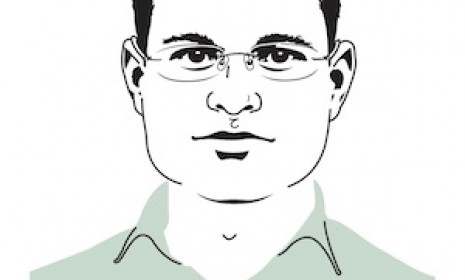The perks and perils of our newly indexed society
Paper documents have become unnecessary relics. But when everything is digital and searchable, it comes at a steep cost to your privacy


A free daily email with the biggest news stories of the day – and the best features from TheWeek.com
You are now subscribed
Your newsletter sign-up was successful
For a couple of years now, I've used a digital-recorder-equipped Livescribe pen during interviews as a way to ensure the accuracy of my notes. It's an ungainly device — the definition of inelegance and easily the worst pen I've ever used — but it records sound quite well, creates a digital copy of my physical notebooks, and allows me to "jump" to the audio captured at the moment when it was written. These are very useful features for someone with terrible handwriting and the organizational skills of a rabid monkey.
Then, a few months ago, I backed up my handwritten notes to Evernote, if for no other reason than a perpetual and irrational fear of some natural disaster destroying my computer and filing cabinet. (Evernote stores all of my files in the cloud.) I really didn't think much about it until recently, when I was researching an article and recalled pasting a webpage into Evernote for future reference. I typed my query into the search box, and a few results came up, including the handwritten notes I'd imported from my Livescribe pen. Somehow, Evernote had figured out how to recognize those scribbles in my notebook as approximations of the Latin-derived alphabet, and that together they made up words and sentences. The computer made my handwriting not only legible, but searchable. My handwriting was even highlighted where it matched the search term.
It's worth considering what kind of future this suggests. I have no doubt that the type of recording sensor used in Livescribe pens will eventually find its way into a majority of writing implements. "I forgot my homework!" will be a thing of the past; the pen remembers everything. But it's the searchable part that is, for some reason, exciting and unsettling.
The Week
Escape your echo chamber. Get the facts behind the news, plus analysis from multiple perspectives.

Sign up for The Week's Free Newsletters
From our morning news briefing to a weekly Good News Newsletter, get the best of The Week delivered directly to your inbox.
From our morning news briefing to a weekly Good News Newsletter, get the best of The Week delivered directly to your inbox.
Philip K. Dick once said of the wild possibilities of science fiction, "It's not just 'What if' — it's 'My God; what if?'" I cast an eye about my office, and see hundreds of books, the contents of which are searchable on Google Books and Amazon. Most of my files are needless hard copies of electronic documents — PDFs and such. Even then, they're rarely functional; if a document needs a signature, I sign it with my iPad and send it along. (The paper copy is to satisfy an ingrained habit.) Though I don't know for sure, I have a feeling that everything I get in the mail has a digital counterpart. Certainly bills, magazines, catalogs, and newspapers.
It seems that all at once, all of the information in the physical realm has become vestigial. How likely are preschoolers today to have a filing cabinet when they reach adulthood? A spiral-bound notebook when they reach high school? Stickers on a binder when they reach grade school? No country for dead trees.
Jeffrey Rosen once wrote of privacy, "We are only beginning to understand the costs of an age in which so much of what we say, and of what others say about us, goes into our permanent — and public — digital files. The fact that the internet never seems to forget is threatening, at an almost existential level, our ability to control our identities; to preserve the option of reinventing ourselves and starting anew; to overcome our checkered pasts." Bruce Schneier, a security technologist, wrote of the astounding amount of electronic material we provide to others, or that others collect from us, that "just as 100 years ago people ignored pollution in our rush to build the Industrial Age, today we're ignoring data in our rush to build the Information Age."
We give away an astonishing amount of information today, as everyone with a Facebook account knows. It's also interesting to note how much information we give away unintentionally. In an effort to learn which of its customers were pregnant, "even if she didn't want us to know," Target began mining its receipts for useful data. (Yes, if you use a credit card, you have a unique Target identifier.) The giveaway turned out to be prenatal vitamins. "We knew that if we could identify them in their second trimester, there's a good chance we could capture them for years... As soon as we get them buying diapers from us, they're going to start buying everything else too."
A free daily email with the biggest news stories of the day – and the best features from TheWeek.com
None of this is news, of course. We've lived in glass ghettos for several years now, and have found excellent ways not only to throw ourselves at the feet of our retail masters, but also to cast aside any right to the Fourth Amendment. (No law enforcement or government agency needs a warrant to download what you've posted to social networks. It can and will be used against you.) The surprising part wasn't so much that government and industry found a way to help us surrender even the most intimate details of our lives. Rather, it was how grateful we were for the chance.
Online data storage and productivity tools present their own problems for the future. As we move to the cloud, data that we would never post to our Facebook timelines will nonetheless migrate to the internet. Even our handwritten notes. We live in a world with little privacy, no substantive security or accountability regulations, state-sponsored cyber-espionage, strident hacker groups, and the full knowledge that what leaks to the internet, stays on the internet forever — and will be fully searchable. And we're okay with that. At some point, someone or some government will find a way in, and things will get very bad, indeed. "When sorrows come," said Claudius, "they come not single spies, but in battalions."
David W. Brown is coauthor of Deep State (John Wiley & Sons, 2013) and The Command (Wiley, 2012). He is a regular contributor to TheWeek.com, Vox, The Atlantic, and mental_floss. He can be found online here.
-
 Regent Hong Kong: a tranquil haven with a prime waterfront spot
Regent Hong Kong: a tranquil haven with a prime waterfront spotThe Week Recommends The trendy hotel recently underwent an extensive two-year revamp
-
 The problem with diagnosing profound autism
The problem with diagnosing profound autismThe Explainer Experts are reconsidering the idea of autism as a spectrum, which could impact diagnoses and policy making for the condition
-
 What to know before filing your own taxes for the first time
What to know before filing your own taxes for the first timethe explainer Tackle this financial milestone with confidence
